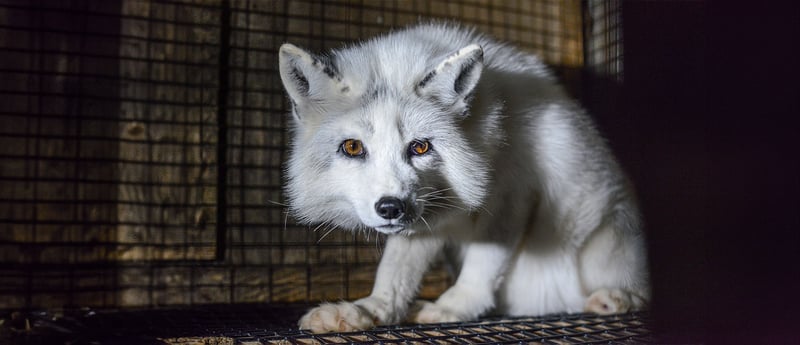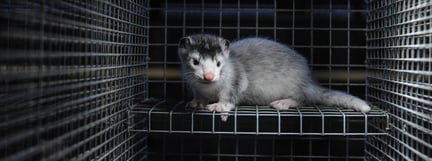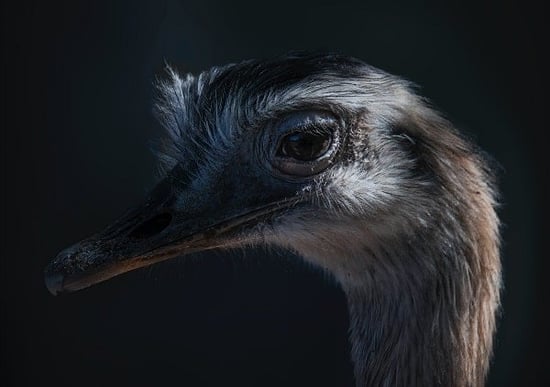
To the New Zealand fashion industry: it’s time to protect wildlife
News
Aotearoa wants to be seen as a global leader when it comes to advocating for animals.

A decade ago, our Animal Welfare Act was amended to explicitly state that animals are sentient, meaning a legal recognition that animals experience both positive and negative emotions. Then more recently in 2023, the live export of animals by sea was banned, followed the year after by the announced phase out of greyhound racing.
Despite the global movement in improving animal welfare standards in many industries, New Zealand's fashion industry leaders are yet to take a strong stand against commercial wildlife farming for fashion. Which means that fox fur, crocodile leather, and ostrich feathers are still permitted on our runways. While the New Zealand fashion industry focusses heavily on sustainability, people and the planet – animals remain missing from the conversation.
Ask NZFW to go wildlife free
Add your voice to our letter to New Zealand Fashion Week asking them to go wildlife free.
Every year millions of wild animal species, from minks to ostriches, suffer and die as part of large-scale farming operations. These animals are often confined to barren and cramped cages, deprived of all that's important and natural to them, and ultimately meet a violent slaughter. All to become a coat, a handbag or a trim on a dress. It’s clear commercial farming of wild animals drives significant animal suffering, so those who continue to use these materials need to understand the risk of having cruelty in their supply chain.
The fur, crocodile and ostrich industries invest heavily in marketing themselves as sustainable, but in reality that’s not the case. Keeping of thousands of animals on fur farms, crocodile farms or ostrich feedlots has a severe ecological footprint, requiring immense land, water, feed, and energy resources. To point to one example, research from ‘CE Delft’ compared the climate impact of mink fur versus synthetic faux fur and found that mink fur had a significantly higher environmental impact than its faux counterpart.
There are some key players doing the right thing by wildlife in Aotearoa’s fashion industry. The iconic Karen Walker has an animal welfare policy that prohibits the use of feathers and fur, as well as any products that have been derived from animals slaughtered exclusively for their skin. Additionally, Glasson’s animal welfare policy strictly prohibits ostrich feathers, which have horrifyingly started being used as a replacement to fur trim on garments.
Further afield, Fashion Week events around the world are showing a strong commitment to the future of fashion being wildlife free. London Fashion Week, Australian Fashion Week, Berlin Fashion Week and Copenhagen Fashion Week have enthusiastically embraced wildlife policies, banning wild animal materials from their runways.
Wildlife free fashion
Right now, millions of wild animals are being captured, abused, bred, and mercilessly slaughtered so that the fashion industry can maximise their profit.
Copenhagen-based designer Nicklas Skovgaard points to Copenhagen Fashion Week’s policy prohibiting the use of wild bird feathers (a policy World Animal Protection helped to implement) as leading him to seek out creative substitutes. Furthermore, he praised the event for actively promoting “an inspiring opportunity for growth and reinvention.”
Wildlife-friendly fashion is not just a passing trend - it represents a fundamental shift in the way we think about fashion and our impact on the world. The New Zealand fashion industry has a unique and exciting opportunity to embrace responsible fashion and create beautiful and innovative designs, while implementing progressive policies that end the support of cruel wildlife farming for skin, feathers and fur.
We are ahead in so many other areas when it comes to animal welfare, but it’s time for the New Zealand fashion industry to match that leadership and show a commitment towards a future of fashion that excludes wild animal materials.
Olivia Charlton is the Campaign Manager for Wildlife at World Animal Protection, where she works alongside major fashion week events and brands to implement policy banning wild animal materials. Prior to her animal advocacy career, Olivia spent almost a decade in apparel manufacturing roles for major New Zealand clothing brands. While in the industry, a major investigation into the cruel treatment of rabbits in the angora industry was launched and resulted in the industry rapidly banning the material, which inspired Olivia to redirect her efforts into ending the use of fur, wild animal skins and feathers in fashion.
Image credits: Jo-Anne McArthur / We Animals Media
Ask NZFW to go wildlife free
Add your voice to our letter to New Zealand Fashion Week asking them to go wildlife free.
Donate to protect animals
Magnificent ostriches farmed for their feathers are trapped inside barren yards, left hungry and exhausted.


